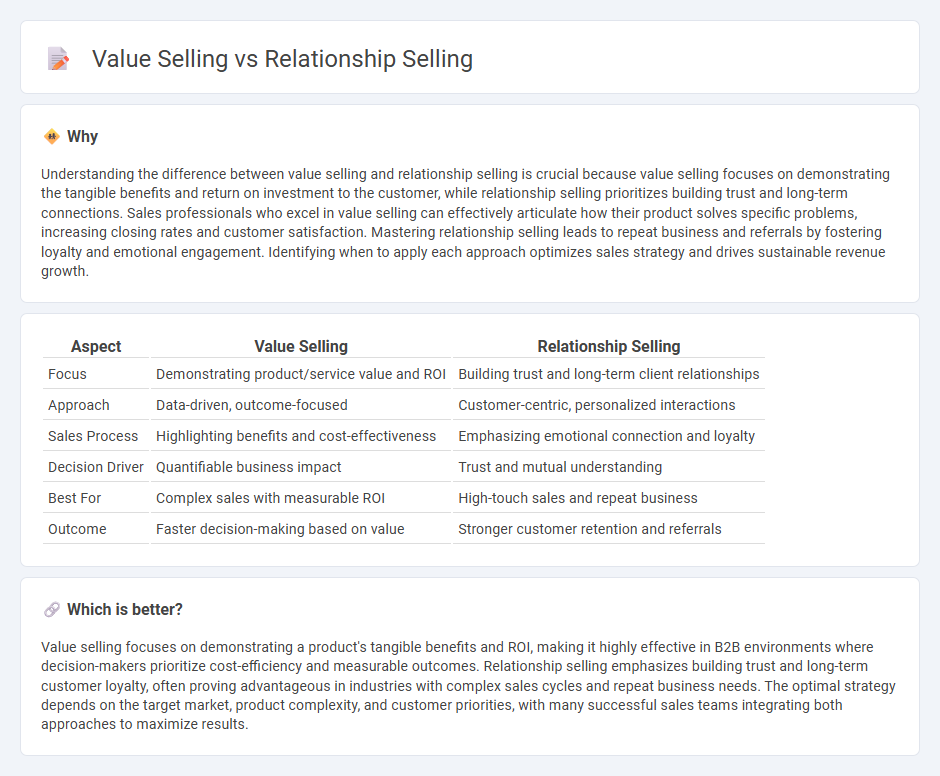
Value selling focuses on demonstrating the tangible benefits and ROI of a product or service, enabling customers to see the direct impact on their business goals. Relationship selling emphasizes building long-term trust and rapport, fostering loyalty through personalized communication and consistent support. Explore the nuances of these sales strategies to enhance your approach and drive better results.
Why it is important
Understanding the difference between value selling and relationship selling is crucial because value selling focuses on demonstrating the tangible benefits and return on investment to the customer, while relationship selling prioritizes building trust and long-term connections. Sales professionals who excel in value selling can effectively articulate how their product solves specific problems, increasing closing rates and customer satisfaction. Mastering relationship selling leads to repeat business and referrals by fostering loyalty and emotional engagement. Identifying when to apply each approach optimizes sales strategy and drives sustainable revenue growth.
Comparison Table
| Aspect | Value Selling | Relationship Selling |
|---|---|---|
| Focus | Demonstrating product/service value and ROI | Building trust and long-term client relationships |
| Approach | Data-driven, outcome-focused | Customer-centric, personalized interactions |
| Sales Process | Highlighting benefits and cost-effectiveness | Emphasizing emotional connection and loyalty |
| Decision Driver | Quantifiable business impact | Trust and mutual understanding |
| Best For | Complex sales with measurable ROI | High-touch sales and repeat business |
| Outcome | Faster decision-making based on value | Stronger customer retention and referrals |
Which is better?
Value selling focuses on demonstrating a product's tangible benefits and ROI, making it highly effective in B2B environments where decision-makers prioritize cost-efficiency and measurable outcomes. Relationship selling emphasizes building trust and long-term customer loyalty, often proving advantageous in industries with complex sales cycles and repeat business needs. The optimal strategy depends on the target market, product complexity, and customer priorities, with many successful sales teams integrating both approaches to maximize results.
Connection
Value selling and relationship selling are interconnected through their shared focus on addressing customer needs and building trust to drive long-term business success. Value selling emphasizes demonstrating the tangible benefits and ROI of a product or service, while relationship selling centers on developing strong, personalized connections that foster loyalty and repeat business. Together, they create a sales strategy that combines delivering measurable value with nurturing ongoing client partnerships.
Key Terms
**Relationship Selling:**
Relationship selling emphasizes building long-term trust and emotional connections with customers by understanding their needs and providing personalized solutions. It focuses on fostering loyalty through consistent communication, rapport, and customer satisfaction rather than just transactional benefits. Discover how mastering relationship selling can enhance client retention and drive sustainable business growth.
Trust
Relationship selling emphasizes building long-term trust and emotional connections with customers to foster loyalty and repeat business. Value selling centers on demonstrating the tangible benefits and ROI of a product or service, establishing trust through proven results and customer satisfaction. Explore deeper insights into how trust shapes sales strategies by learning more about relationship versus value selling approaches.
Rapport
Relationship selling emphasizes building strong personal connections and trust with customers, fostering long-term loyalty and repeat business. Value selling centers on demonstrating the measurable benefits and outcomes that a product or service delivers, highlighting its impact on solving customer problems. Explore how prioritizing rapport in each approach can transform your sales strategy and drive success.
Source and External Links
Relationship Selling: 13 Tips to Sell Better and Close More Deals - Relationship selling is a sales technique where the focus is on building a genuine connection with the customer by providing value, understanding their challenges, and offering tailored solutions, rather than just pushing for a quick sale.
Relationship selling: Why it pays off to be human in sales - This approach emphasizes long-term partnerships and trust by prioritizing the customer's needs, actively listening, and maintaining ongoing engagement even after the sale is closed.
Relationship Selling: Definition, Techniques and Examples - Relationship selling centers on creating personal connections with customers, fostering loyalty and trust by focusing on their interests and needs, which is especially effective for high-commitment purchases.
 dowidth.com
dowidth.com